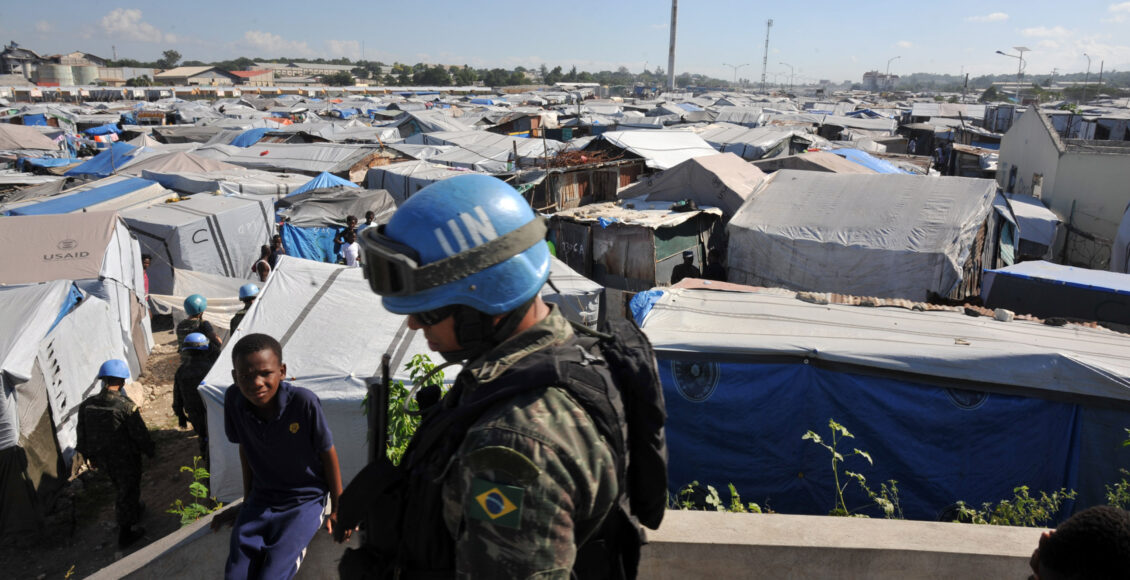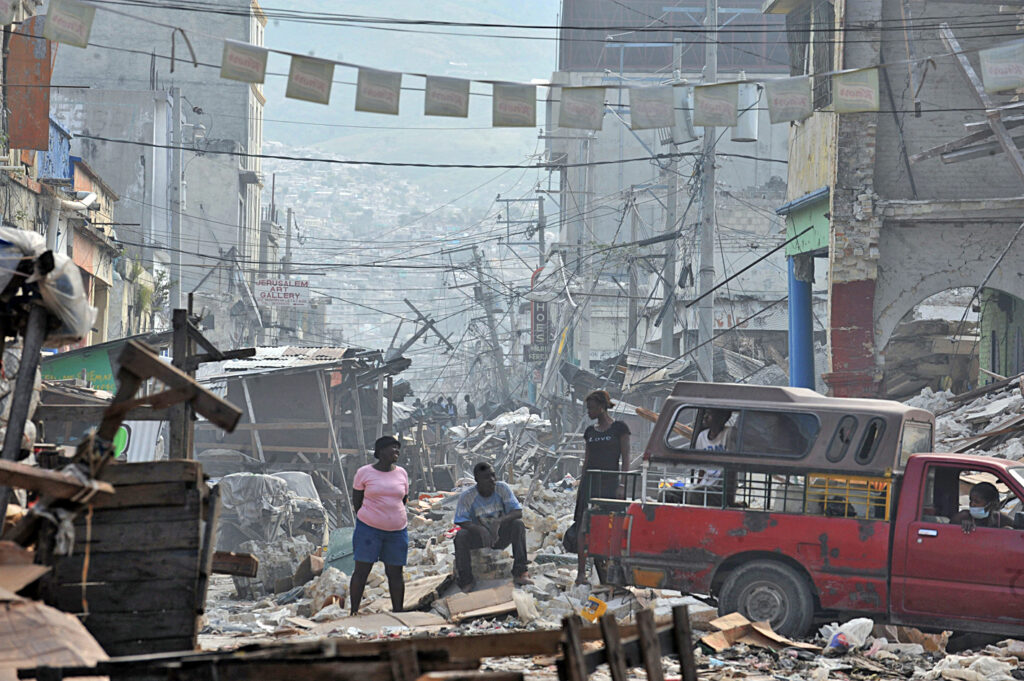International Intervention In Haiti: the United Nations’ Recurring Failure

On September 30th, the United Nations Security Council (UNSC) unanimously renewed its support for another year of the Kenyan-led security mission in Haiti. Security Council members extended messages of hope and solidarity to Haitian citizens, and calls emerged to transform the current mission into a peacekeeping one. For almost a year, gang activity has steadily increased as political instability and dire humanitarian conditions persist despite the existing mission in place. The call to deploy a peacekeeping mission in Haiti recalls the international community’s past failures to assist the country effectively. Consequently, discussions of a new international support program must acknowledge the necessity of significant structural changes.
Haiti’s complex and tumultuous history has caused major political and economic instability, as well as severe humanitarian issues. In the 1980s, after almost thirty years of dictatorship under the Duvalier dynasty, a pro-democratic movement emerged, and a new constitution was drafted. The 1987 constitution was doomed to fail. The reforms it proposed would have required establishing political infrastructure that Haiti did not possess. Political instability returned following Haiti’s first democratic election. Jean-Bertrand Aristide, who won that election but failed to deliver on much-needed campaign promises, such as combating poverty and holding parliamentary elections. This angered the population, triggering violent unrest. Aristide was twice ousted as president, and, since his election, Haiti has struggled to maintain high human rights standards. This issue is exacerbated by Haiti’s long history of devastating natural disasters. The country is situated on a fault line and in the path of destructive hurricanes.

Despite becoming the first independent colony of the Americas after Toussaint Louverture’s 1804 revolution, Haiti has been burdened by a detrimental long-term debt deal with France. Twenty years after the revolution in 1804, the French returned with an ultimatum: either reparations for the revolt or war. The New York Times estimates that $560 million was paid to France over a period of 122 years. In 2004, Aristide famously demanded $21,685,135,571.48 be paid to Haiti as reparations from the French. Although the US and France deny a correlation, soon after this demand was made, the US ousted Aristide as president. With Aristide in exile, armed conflict broke out, prompting the United Nations (UN) to deploy a Multinational Interim Force.
In the summer of 2021, the assassination of then-president Moïse marked the beginning of a new era of gang violence. Moïse was replaced by Ariel Henry, who was wildly unpopular. Gang violence reached a high in March 2024 when an alliance of gangs attacked the Port-au-Prince airport, stranding Henry, who had been at a regional conference in Puerto Rico. Henry ultimately resigned in July 2024, and was replaced by a transitional council. Beyond the airport, gangs have stormed several important government infrastructures, notably two major prisons and the capital’s port. They have also blocked major roads and aid routes, preventing the arrival of supplies. The BBC has reported that gangs control 90 percent of the country’s capital. The UN has reported a death count of over 3,600 and the number of displaced persons is set to surpass 500,000 this year alone. The UN recently reported that half the population is now facing acute hunger.

It may seem as though international intervention is the answer to Haiti’s ongoing humanitarian crisis. However, a closer look at the international community’s past aid ventures in Haiti reveals a problematic pattern.
Starting in the 1990s, the United Nations began to intervene in Haitian affairs. At the request of recently overthrown ex-president Aristide, the United Nations launched the International civilian Mission in Haiti (MICIVIH) in 1993, in order to monitor and investigate human rights violations. This would then be followed by a number of lengthy missions; UN staff remains on the ground to this day. These missions, although numerous, have come to be characterized by their failure to deliver tangible results for the Haitian people.
The first extreme failure has been the missions’ inability to achieve one of the mandates’ main aims: the eradication of gang violence. Currently, gangs outnumber and out-weapon national police forces. At the UNSC meeting mentioned above, many members expressed the urgency for the immediate and thorough disarmament of the gangs. Past UN missions failed to make arms interceptions a priority; if the current mission does the same, the most it could achieve is a temporary break in gang violence, not its total eradication. With a lack of serious attention to disarmament, gang violence would likely reemerge soon after the peacekeepers’ departure.
Meanwhile, UN peacekeepers have perpetrated human rights abuses at the expense of the Haitian people. MINUSTAH, perhaps the most infamous peacekeeping mission, has come to be characterized by disease propagation, sexual abuse, and human trafficking. A Cholera outbreak, after almost 100 years of eradication, was traced back to Nepalese peacekeepers dumping their waste in the Artibonite River, a primary water source. The resulting epidemic has killed over 10,000 Haitians, with infection numbers surpassing 80,000. Alongside the spread of sexually transmitted diseases resulting from sexual abuse by peacekeepers, at least 134 Sri Lankan peacekeepers have since been linked to a child trafficking ring from 2004 to 2007, offering food for sexual favors. Gerard Jean-Gilles’ suspicious death and the sexual assault of Johnny Jean at the hands of Uruguayan peacekeepers made international headlines, further evidence of severe abuse by UN peacekeepers.
The issue here lies in the lack of enforcement measures for the perpetrators while employed by the UN. The organization can do little more than send perpetrators home, and they often go unpunished upon returning to their country. Hence, accountability for human rights abuses by peacekeepers must be a priority for any peacekeeping mission, and must be closely monitored. An enforcement mechanism by the UN, while unlikely to materialize, would drastically increase peacekeeping missions’ legitimacy and possibility of success. A country cannot heal from human rights abuses when the forces sent to remediate the issues only make them worse.
The impending peacekeeping operation in Haiti must emphasize the wrongdoings of past missions. Most importantly, the program must be constructed to offer long-term solutions to prevent the situation from immediately deteriorating at the peacekeepers’ departure. Failures of past missions must inform new ones: long-term solutions will come from the resolution and reparation of peacekeepers’ abuses. An inability to hold UN peacekeepers accountable has the potential to delegitimize the peacekeeping mission and jeopardize the mission’s ability to achieve long-term solutions. A closer overseeing of peacekeepers’ activities by the UN and sending countries, inquiries into past abuses, and the implementation of systems to prevent them are urgent and indispensable.
Edited by Inès Salvador-Coumont
Featured image: A MINUSTAH Brazilian peacekeeper patrols Jean Marie Vincent Camp in 2010. “File:26112010MC0145.JPG” by Marcello Casal Jr is licensed under CC BY 3.0 BR.
